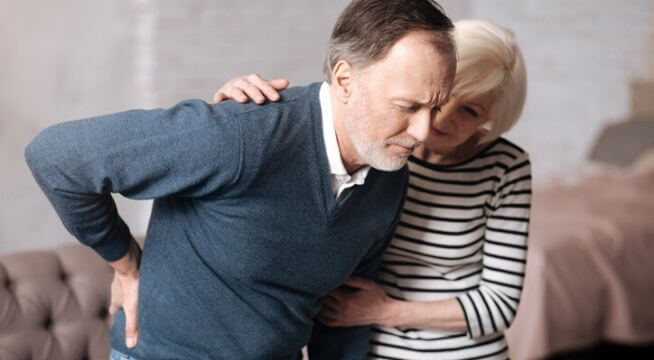When to Go to the ER for Back Pain
Back Pain
•
Dec 8, 2019

If you live a semi-sedentary lifestyle, then there are good odds that you may experience some sort of back pain during your lifetime. But, sedentary lifestyles aren’t the only cause of back pain. With so many different variations, it can be difficult to determine when a trip to the local store for an ice pack or a trip to the emergency room is more appropriate. So, how do you know when a trip to the ER is necessary, and what caused your pain in the first place?
Causes of Back Pain
The cause of your back pain is typically determined by the location, severity, and duration of your pain. If your pain is acute, happened suddenly, and lasts less than six weeks, then it’s likely due to an overuse injury – such as a herniated disc, muscle strain, or sciatica. While chronic back pain usually lasts more than three months and is the result of degenerative disc disease, spinal conditions, or spinal stenosis.
But, acute and chronic aren’t the only causes of back injuries. Back pain can also be the result of:
- Lack of exercise
- Aging
- Sedentary lifestyle
- Poor diet
- Poor posture
5 Back Injuries that Require an Emergency Room Visit
1. Slipped Disc
Discs are located between the individual bones that construct the spine. Each bone is cushioned by them so as not to come into contact with each other. But, when a disc slips and is pushed out of the spine, it can cause severe back pain. Slipped discs — also known as a herniated disc — are usually the result of excessive bending or lifting of heavy objects from the floor. When the disc protrudes, it can irritate nearby nerves, which is what causes the pain in your back.
Symptoms of a herniated disc may include:
- Pain and numbness associated with one side of the body
- Pain that extends into your arms or legs
- Pain that worsens overnight or with specific movements
- Pain when standing, walking, or sitting
- Muscle weakness
- Tingling, aching, or burning sensations
2. Arthritis
When present on the hands or knees, arthritis is uncomfortable but overall manageable. When present in the spine, it can cause severe pain and makes standing up difficult. Sometimes, this can also impact the ribs – making it very difficult for you to breathe. Symptoms typically include pain and stiffness in your lower back and hips – especially after inactivity or a night of sleep.
The most commonly affected areas include:
- The joint between the base of your spine and pelvis
- Vertebrae in your lower back
- Places where tendons and ligaments attach to bones
- The cartilage between your breastbone and ribs
- Hip and shoulder joints
3. Sciatica
When you experience a herniated disc, but fail to resolve the issue. The disc can wear over time and push into the longest nerve in your body – the sciatic nerve. This can produce severe pain in your lower back and make it difficult to move. Sciatica can be severe, and in those cases, physical therapy can help relieve the issue.
Symptoms of Sciatica often include:
- Pain on one side of the body
- Lower back pain
- Pain in your buttock or leg when sitting
- Hip pain
- Burning or tingling down your leg
- Weakness, numbness, or difficulty moving your leg or foot
- Shooting pain down your leg that makes it difficult to stand
4. Cauda Equina Syndrome
If you’re experiencing back pain and it includes bowel issues — including uncontrolled urination or the desire to urinate but being unable — then the problem is likely cauda equina syndrome. This happens when the nerve sac in your lower spine is compressed, and the nerves at the end are damaged. Since the result is usually uncomfortable, it’s important to see an emergency care clinic immediately to relieve the issue.
Including bowel issues, cauda equina syndrome signs also include:
- Severe lower back pain
- Motor weakness, sensory loss, or pain in one or both legs
- Saddle anesthesia – the inability to feel in the body areas that sit on a saddle
- Recent bladder dysfunction
- Sensory abnormalities in the bladder or rectum
- Recent onset of sexual dysfunction
- Loss of reflexes in the extremities
5. Kidney Disease
The correlation between your kidneys and back pain may not be second-nature, but the truth is that your kidneys are one of the organs situated at the back of the abdominal wall. That means that when your kidneys are having issues, they can cause lower back pain. This pain is often called referred pain because it’s pain caused by somewhere else in the body.
Kidney disease symptoms typically include:
- Severe lower back pain
- Fever
- Vomiting
- Painful urination
- Nausea
- Fatigue
- Swollen feet or ankles
- Foamy urination
Emergency Services in Colorado Springs and Texas
If you or a loved one are showing signs of having severe back pain, we can provide the care you need. If you have questions or need immediate treatment, your nearest Complete Care location is ready to help, no matter the time of day or night. We offer a variety of services to help you and your family in your time of need. No appointments are necessary.
Find the Complete Care location nearest you.